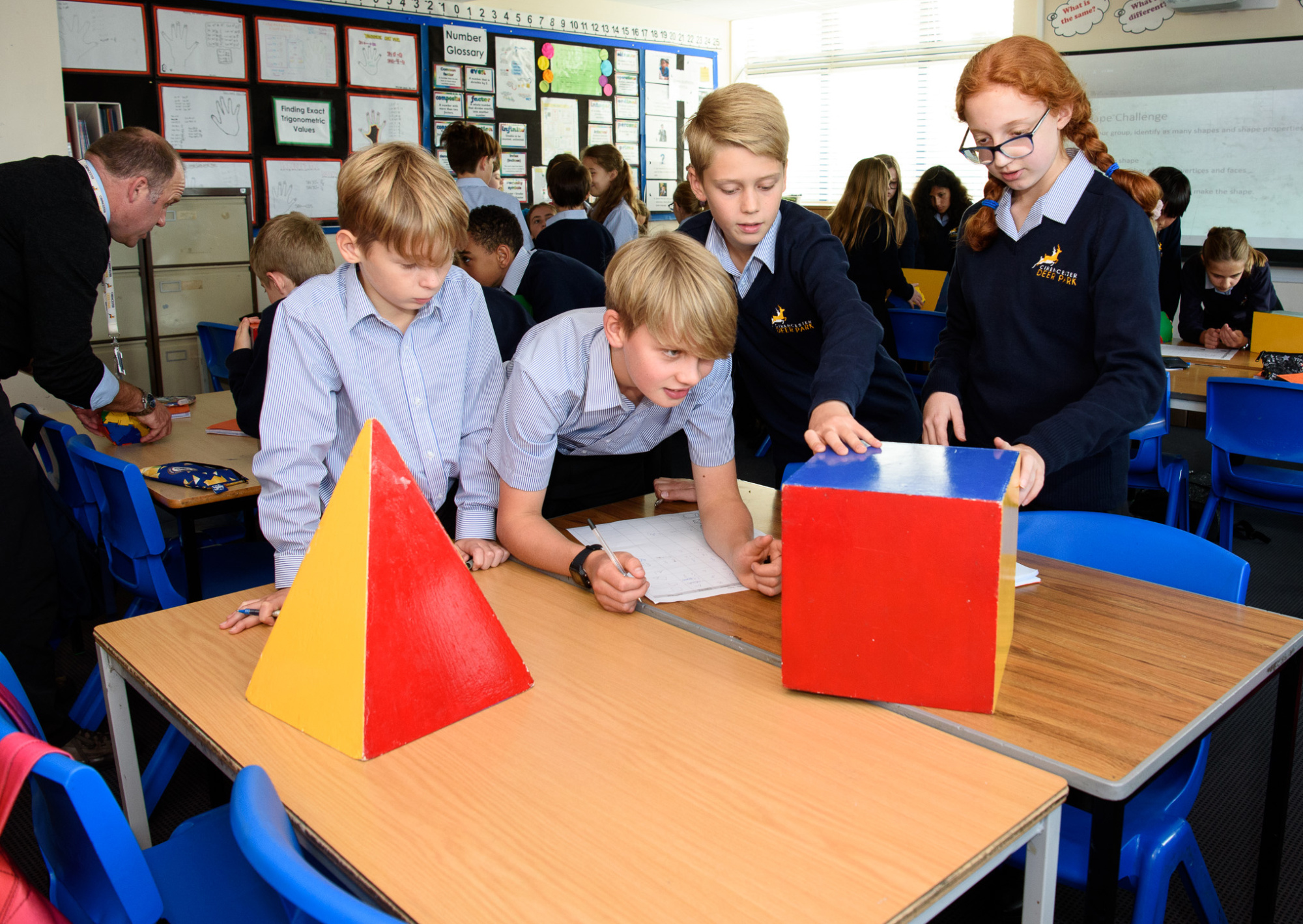Mathematics

At Cirencester Deer Park School, our goal is for every pupil to be confident, competent and numerically fluent.
Teaching in Maths is enthusiastic and focused on developing pupils’ understanding of important concepts, shaping pupils’ mathematical experience to enable them to be independent, creative and curious learners. Pupils encounter a variety of learning opportunities with an emphasis on developing mathematical independence through rich tasks, problem solving, mathematical discussion and use of appropriate technology. Functional skills activities also help prepare pupils for maths beyond the classroom.
There are six areas of learning:
- Number
- Algebra
- Ratio, Proportion and Rates of Change
- Geometry
- Probability
- Statistics
Our objective is to prepare all of our pupils for adult life by ensuring they are able to:
- consolidate their numerical and mathematical capability from Key Stage 2 and further extend their understanding of the number system, along with other mathematical concepts
- become fluent in the fundamentals of mathematics, developing conceptual understanding and the ability to recall and apply knowledge rapidly and accurately
- reason mathematically by following a line of enquiry, developing an argument, justification or proof using mathematical language
- solve problems by applying mathematics to a variety of routine and non-routine problems with increasing sophistication, including breaking down problems into a series of simpler steps.
We want every pupil to engage with the power of Maths so that they develop the skills and confidence to achieve and progress throughout their lives.
Find out about each Key Stage in Mathematics:
KS3 Mathematics Programme of Study
Our Key Stage 3 Maths programme helps pupils to boost their mathematical confidence, raise attainment and provides them with the best preparation for their GCSE Maths and beyond, by exploring these areas:
- Fluency;
- Problem solving;
- Reflection;
- Mathematical reasoning;
- Progression;
- Linking;
- Multiplicative reasoning;
- Concrete-pictorial-abstract;
- Relevance.
The scheme of work is differentiated based on the needs and ability of the group. The core outline of the curriculum from September 2020 is as follows:
YEAR 7 Core curriculum
Unit 1 Analysing and displaying data
Unit 2 Number skills
Unit 3 Expressions, functions and formulae
Unit 4 Decimals and measures
Unit 5 Fractions and percentages
Unit 6 Probability
Unit 7 Ratio and proportion
Unit 8 Lines and angles
Unit 9 Sequences and graphs
Unit 10 Transformations
YEAR 8 Core curriculum
Unit 1 Number
Unit 2 Area and volume
Unit 3 Statistics, graphs and charts
Unit 4 Expressions and equations
Unit 5 Real-Life graphs
Unit 6 Decimals and ratio
Unit 7 Lines and angles
Unit 8 Calculating with fractions
Unit 9 Straight-line graphs
Unit 10 Percentages, decimals and fractions
YEAR 9 Core curriculum
Unit 1 Indices and standard form
Unit 2 Expressions and formulae
Unit 3 Dealing with data
Unit 4 Multiplicative reasoning
Unit 5 Constructions
Unit 6 Sequences, inequalities, equations and proportion
Unit 7 Circles, Pythagoras and prisms
Unit 8 Graphs
Unit 9 Probability
Unit 10 Comparing shapes
Pupils will spend around 10 to 12 hours on each unit. There will be assessments based around the material covered to support the consolidation of learning and to help teachers and pupils identify strengths and areas for further development.
KS4 Mathematics Programme of Study
All pupils in Key Stage 4 are studying the 9-1 GCSE Mathematics course set by Edexcel. This is a two-year course with three examination papers sat in the summer of Year 11, two of which are calculator papers and the other is a non-calculator paper and grades 1 to 9 are available. The exams cover different areas including: Statistics and Probability, Number, Algebra, Ratio, Proportion and Rates of Change, Geometry and Measures. Find out more...
In addition, more able pupils will be offered the opportunity to complete the Statistics GCSE qualification after school, also provided by Edexcel, to be sat at the end of Year 10. This includes two 90-minute written examinations and grades 1 to 9 are available. Find out more...
Further to the above, a select group of pupils will also be invited to work towards the FSMQ Additional Maths qualification provided by OCR in Year 11. This requires a firm commitment to attend extra lessons after school and is suitable for able mathematicians who intend to further their study of mathematics post 16. The assessment consists of one written examination of 2 hours and grades E to A are available. Find out more...
Useful Links and Revision Pointers:
It is really important that pupils constantly revise their maths learning from their lessons. This will help them recall the information that they need in their exams at the end of the course. The earlier that they start revising the better prepared they will be: they should read through their notes from lessons and ensure that they fully understand the mathematical concepts covered. If they don’t understand then they should ask their teacher for some help!
Below are some useful websites and leaflets that we would recommend pupils use to help support their mathematical understanding:

